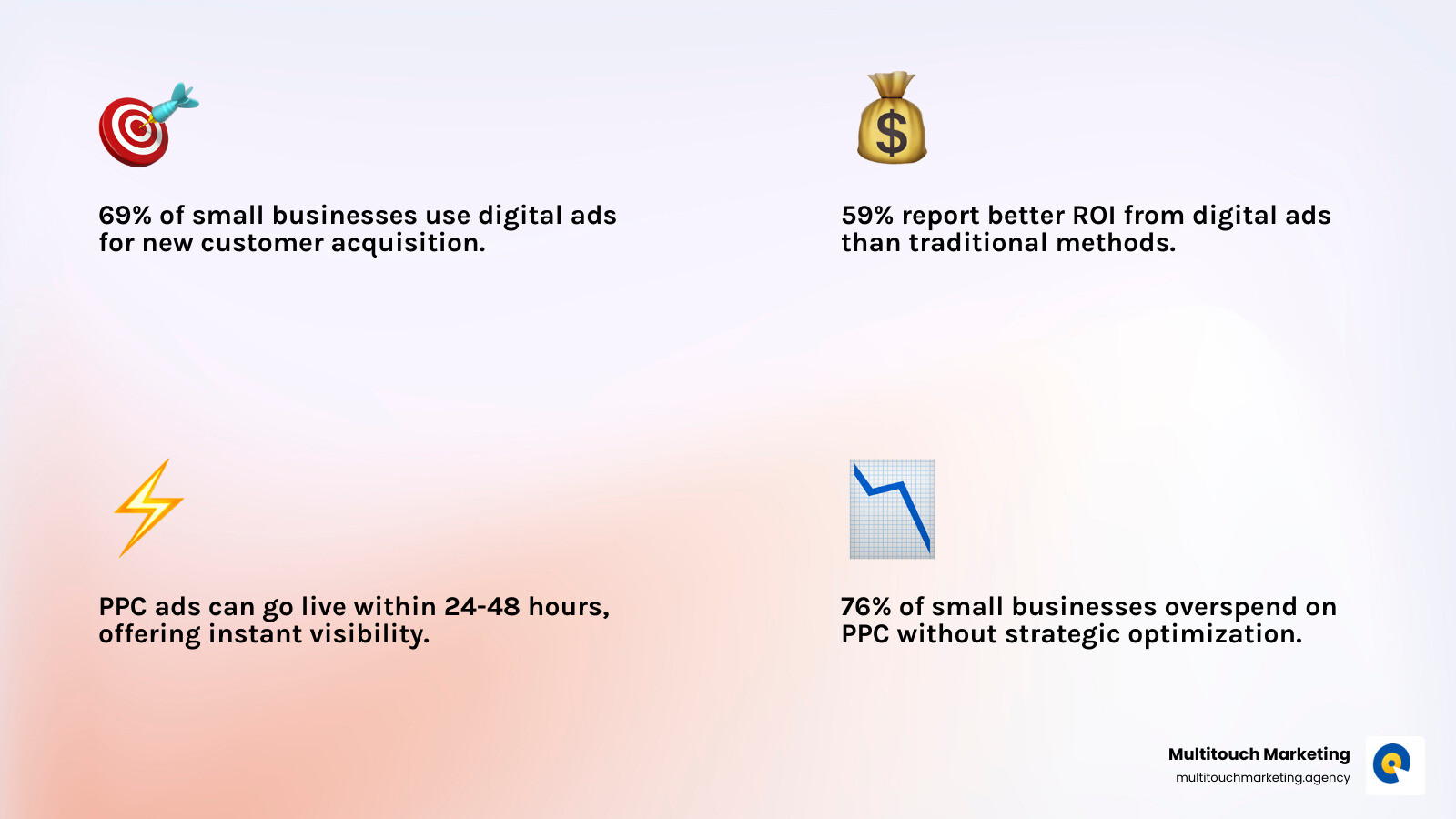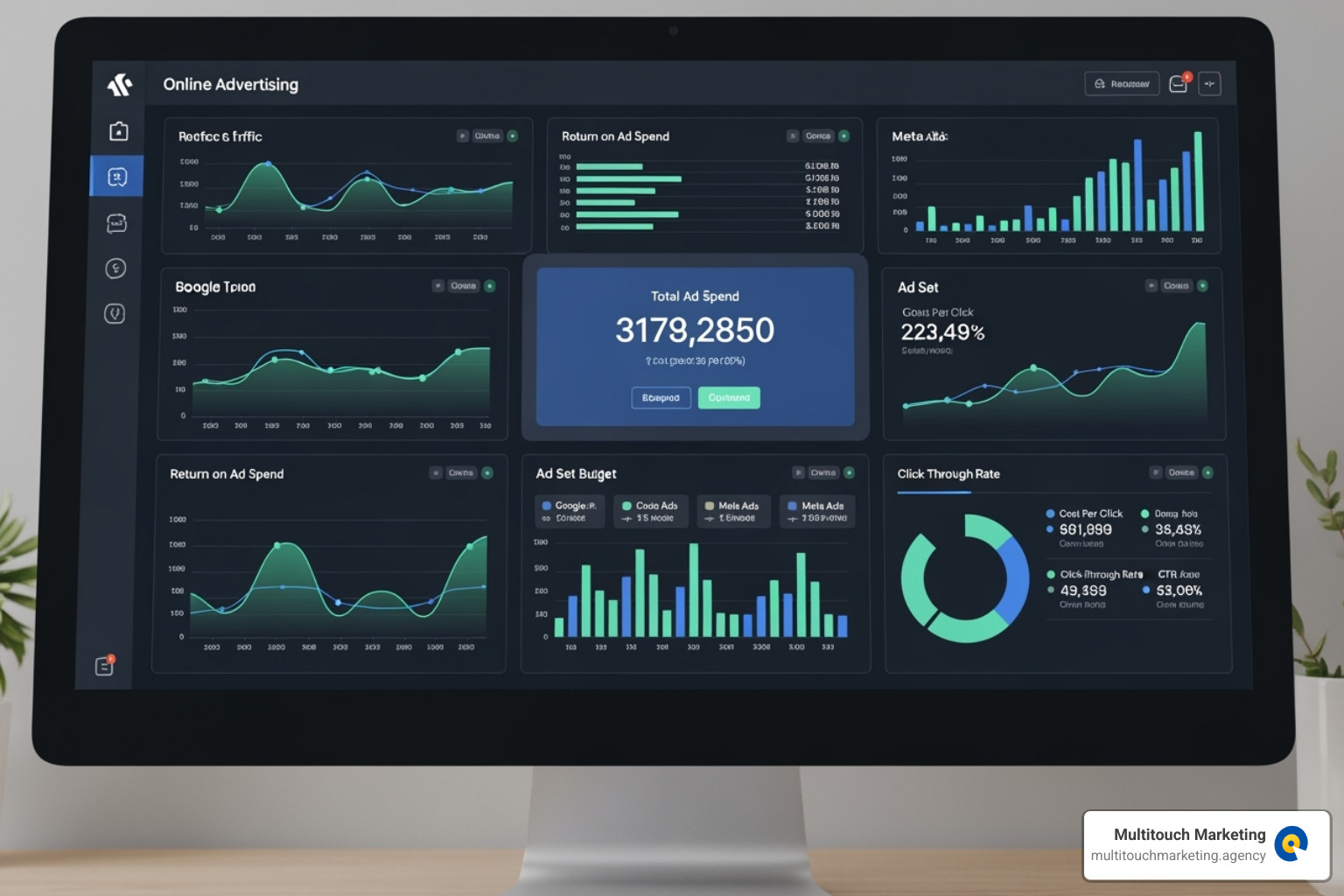Why Small Businesses Are Turning to PPC for Instant Growth
PPC Management for Small Business is the process of creating, managing, and optimizing pay-per-click (PPC) ad campaigns to drive targeted traffic and conversions while maximizing return on investment (ROI).
Key Components of PPC Management:
- Campaign Setup: Creating structured ad groups with themed keywords
- Budget Management: Setting daily/monthly spending limits and bid strategies
- Ad Creation: Writing compelling headlines and descriptions with clear CTAs
- Landing Page Optimization: Ensuring ad-to-page consistency for better conversions
- Performance Tracking: Monitoring CTR, conversion rates, and ROAS
- Ongoing Optimization: A/B testing ads and refining targeting based on data
Today, 69% of small businesses use digital ads to attract new customers, with 59% reporting better ROI than traditional advertising. PPC levels the playing field, allowing small businesses to compete with large corporations for prime digital real estate.
The appeal is clear: PPC ads can go live within 24-48 hours, offering immediate visibility. Unlike SEO, which can take months to show results, PPC instantly places your business at the top of search results for each paid click.
However, effective PPC management is crucial. 76% of small businesses overspend on PPC because they lack the strategic approach needed to optimize campaigns, target the right keywords, and convert clicks into customers.
I’m Milton Brown, a PPC specialist since 2008. I’ve managed budgets from $20,000 to $5 million across industries like healthcare, e-commerce, and education. My experience with PPC Management for Small Business shows that success combines data-driven strategies with continuous optimization to achieve measurable business outcomes.
The Strategic Value of PPC for Small Business Growth
With PPC Management for Small Business, your ads can attract customers within hours of launching a new product, a stark contrast to the weeks or months traditional marketing can take.
PPC provides immediate visibility. Your ad appears at the top of search results when someone searches for your offerings, capturing attention instantly without waiting for SEO rankings to improve.
PPC also offers laser-focused targeting. You can reach specific demographics, like dog owners in downtown Raleigh searching for grooming services on a particular day. This precision ensures your marketing budget isn’t wasted on irrelevant audiences.
Excitingly, PPC ads convert 50% better than organic search results. This is because they target users who are actively searching for a solution and are ready to buy.
The measurable ROI is another key benefit. Every click, conversion, and dollar is tracked, providing clear data on which keywords are profitable. This transparency allows for smart, data-driven budget decisions.
PPC also provides complete budget control. You can set daily spending limits and only pay when someone clicks your ad, making it a cost-effective solution for any business. To dive deeper into these benefits, check out our guide on Why PPC Advertising is Beneficial in Business.
PPC vs. SEO: Which is Right for You?
A common question is PPC versus SEO. Both aim for online visibility but differ significantly in their approach and timeline.
| Feature | PPC (Pay-Per-Click) | SEO (Search Engine Optimization) |
|---|---|---|
| Speed | Immediate visibility (ads can go live in hours) | Long-term (can take months for results) |
| Cost | Pay per click (CPC), budget-controlled | Resource-intensive (time, content creation, link building) |
| Control | High control over ad copy, targeting, budget, bidding | Less direct control, reliant on algorithm changes |
| Visibility | Appears in “Ads” section, top of SERPs | Appears in “Organic” section, below ads |
| Longevity | Stops when budget runs out | Continues to provide traffic over time once ranked |
| Effort | Ongoing management, optimization, testing | Continuous content creation, technical optimization, link building |
If you need immediate results, PPC is your answer. SEO, while valuable, is a long-term strategy that builds value over time.
The most effective approach is to use both strategies together. PPC provides immediate traffic and sales while your long-term SEO strategy builds momentum. PPC data on converting keywords can also inform and improve your SEO efforts.
Potential Challenges of PPC
PPC has its challenges, and small business owners should be prepared for them.
PPC requires ongoing investment and attention. It’s not a “set it and forget it” strategy. Campaigns need regular monitoring and optimization to remain competitive, which can be challenging for busy entrepreneurs.
There’s also a steep learning curve. Mastering keyword match types, Quality Scores, and bid strategies is complex, and platforms frequently update their features.
Competition can be brutal in popular industries, leading to high costs per click (e.g., $50 or more). This requires a high conversion rate to avoid quickly depleting your budget.
Perhaps the most frustrating challenge is the clicks versus conversions problem. Getting clicks that don’t convert into sales can lead to wasted ad spend if you’re not constantly optimizing your landing pages and targeting.
The key is understanding these challenges upfront so you can plan for them. For more insights on navigating these waters, take a look at our analysis of Does PPC Work for Small Businesses?.
Your Blueprint for a Successful PPC Campaign
Before launching a PPC campaign, you need a solid game plan, much like having blueprints before building a house.
The foundation of a successful campaign is setting crystal-clear goals, such as driving sales, generating leads, or increasing brand awareness. Every decision should align with these objectives.
A well-organized campaign structure is crucial. The core of this structure is the Adgroup, which functions as a themed collection within your campaign. Each ad group should contain closely related keywords and ads. For example, a financial software business might have ad groups for billing tools and invoicing systems. This organization improves your quality scores and cost-effectiveness.
Step 1: Effective Keyword Research and Selection
Keywords connect your business with customers. Success isn’t just about finding popular terms; it’s about understanding user intent. You must distinguish between informational, comparison, and transactional searches, and match your keywords to their intent to succeed.
Small businesses should focus on long-tail keywords first. These longer, specific phrases (e.g., “emergency plumber Raleigh NC”) have lower search volume but indicate higher buying intent.
Google’s own Keyword Planner is an essential free tool. It provides data on search volume and competition, helping you find what your audience is searching for.
Negative keywords are just as important for saving money. These are terms you exclude to prevent your ads from showing on irrelevant searches. For example, a new car dealer would add words like “used” and “repair” as negatives to focus the budget on qualified prospects. Our detailed guide on PPC Negative Keyword Strategy can help you master this technique.
Step 2: Setting a Realistic Small Business Budget
A common question is, “How much should I spend on PPC?” With PPC Management for Small Business, you have complete control over your spending.
Start with your campaign goals and work backwards to set a budget. For example, if your goal is 20 leads at a cost-per-lead of $30, your budget is $600/month. Focus on your return on ad spend (ROAS), not just total spend.
You can set daily or lifetime budgets. Daily budgets offer predictable spending and are often easier for new advertisers, while lifetime budgets provide flexibility for promotions or seasonal campaigns.
When it comes to bidding strategies, you have manual and automated options. Manual bidding gives you full control, which is great for beginners. Automated bidding uses machine learning to optimize for goals like maximizing conversions. I recommend starting with manual bidding to understand campaign performance before experimenting with automation. For a deep dive into budget planning, check out our guide on PPC Campaign Budgeting for Small Businesses.
Step 3: Crafting Compelling Ad Copy and Using Extensions
Crafting compelling ad copy requires understanding customer pain points. Your headlines must grab attention. Include your target keyword and focus on benefits, not just features. For example, instead of “We offer 24/7 emergency plumbing services,” try “Burst pipe at 2 AM? We’ll be there in 30 minutes.”
Your descriptions should expand on the headline and include a clear call-to-action (CTA). Use direct language like “Call now for a free estimate” instead of a vague “learn more.” Tools like the Monster Headline Analyzer can help you write better headlines.
Don’t miss the opportunity to use ad extensions. These free additions provide extra information and make your ad more prominent.
- Sitelinks add links to specific pages like “Services” or “About Us.”
- Call extensions display your phone number, perfect for service businesses.
- Location extensions show your address, which is vital for Local Business PPC Management in markets like Raleigh, NC.
- Callout extensions highlight offers like “Free Shipping,” while structured snippets showcase business aspects like service categories.
Step 4: Optimizing Landing Pages for Conversion
Your landing page is where conversions happen. The golden rule is ad-to-page consistency. If your ad promises “20% off,” your landing page must clearly feature that same offer to avoid confusing visitors.
User experience is critical. Your landing page must load fast, be mobile-friendly, and have clear navigation to guide visitors toward conversion.
Your call-to-action must be prominent and use action-oriented language like “Get My Free Quote Now!” instead of passive words like “submit.”
Finally, build trust with testimonials, reviews, security badges, and clear contact information. These elements make visitors feel confident and turn your landing page into a conversion machine.
Effective PPC Management for Small Business: Tracking and Optimization
Launching a PPC campaign is just the beginning. The real work lies in the ongoing tracking and optimization that turns good campaigns into great ones.
Many small business owners adopt a “set it and forget it” approach, which is why 76% of them overspend on PPC without achieving desired results.
Successful PPC Management for Small Business requires active management and continuous improvement based on data. This optimization process is what makes campaigns profitable, as every data point offers insights for improving performance. For a deeper dive into our optimization philosophy, check out our comprehensive guide on PPC Campaign Optimization.
Key Performance Indicators (KPIs) to Monitor
Managing PPC without tracking key metrics is like driving blindfolded. You must focus on the numbers that align with your business goals.
- Click-Through Rate (CTR) measures ad appeal. While the average CTR is 3.17% for search ads, focus on improving your own CTR over time and ensuring those clicks convert.
- Conversion Rate is the percentage of clicks that result in a desired action (a purchase, form fill, etc.). A low conversion rate with high clicks suggests issues with your landing page or keyword targeting.
- Cost Per Conversion shows how much you pay for each desired action. Along with Return on Ad Spend (ROAS) (revenue per ad dollar), it determines campaign profitability.
- Quality Score is Google’s rating of your ad’s relevance. A higher score can lower your costs and improve ad position.
- Impression Share indicates the percentage of available impressions you’ve captured. A low share suggests you’re missing opportunities due to budget or low ad rank.
These metrics provide a complete picture of campaign performance, guiding your PPC Management for Small Business strategy.
Advanced Optimization Techniques for PPC Management for Small Business
Advanced techniques can dramatically improve results and separate good campaigns from great ones.
A/B testing allows for data-driven improvements. By running A/B tests on headlines, descriptions, and landing pages, you can let user behavior guide your decisions and significantly boost conversions.
Remarketing gives you a second chance with visitors who didn’t convert. By showing targeted ads to them as they browse other sites, you can re-engage an audience already familiar with your brand. This is a powerful way to capture lost leads.
Geotargeting allows for precise location targeting, such as showing ads only to users within a specific radius of your business. This eliminates wasted clicks from people outside your service area.
Time-of-day scheduling lets you show ads during peak conversion times. For example, a B2B service might run ads only during business hours, while a restaurant might focus on evenings and weekends. This avoids paying for clicks when you’re unavailable.
These advanced strategies, which we cover in more detail in our Advanced PPC Techniques guide, help squeeze every bit of performance out of your campaigns.
Common Mistakes and Deciding on Your Management Strategy
Even savvy business owners make simple, costly mistakes with PPC Management for Small Business. Fortunately, these errors are avoidable once you know what to look for.
Top PPC Mistakes Small Businesses Make
- Broad keyword targeting: Targeting “shoes” instead of “women’s running shoes size 7” wastes money on irrelevant clicks and quickly depletes your budget.
- Ignoring negative keywords: Failing to exclude terms like “free” when selling a premium product means you’ll pay for clicks from users who will never convert.
- Poor landing pages: If your page is slow or doesn’t match the ad’s promise, visitors will leave. This disconnect between the ad and the landing page kills conversions.
- No conversion tracking: Without tracking calls, form fills, or purchases, you can’t know if your campaign is successful. Clicks alone don’t pay the bills.
- Neglecting optimization: A “set it and forget it” mentality is fatal. Your campaigns will stagnate while competitors improve.
These pitfalls can quickly turn your marketing budget into an expensive learning experience. For more insights on avoiding these traps, check out our guide on Busting PPC Marketing Myths.
DIY vs. Hiring a Professional for PPC Management for Small Business
Small business owners often wonder: should I manage PPC myself or hire a professional?
The DIY approach saves on agency fees and gives you complete control. Your intimate knowledge of your business is also a significant advantage. However, effective PPC management is time-consuming, requiring hours each week for research, analysis, and optimization. The learning curve is also steep, as platforms change constantly.
47% of small business owners handle their own marketing. Many struggle to get results because they lack the time, make common mistakes, or miss advanced strategies.
Hiring a professional for your PPC Management for Small Business provides years of expertise in strategy, structure, and optimization. Agencies have access to advanced tools and analytics that can improve performance. A professional’s sole focus is maximizing your ROAS. While you run your business, they monitor, test, and refine your campaigns to get the best performance from your budget.
The decision depends on your available time, expertise, and risk tolerance with your marketing budget. If you’re unsure where you stand, we offer a Free PPC Audit to help you understand your current performance and potential for improvement.
Frequently Asked Questions about PPC for Small Businesses
Here are answers to some of the most common questions we get about PPC Management for Small Business.
How much should a small business spend on PPC?
There’s no magic number for a PPC budget. It depends on your industry, goals, and local competition. A competitive field like legal services will have higher costs per click than a niche hobby shop.
Our recommendation? Start small and scale smartly. Begin with a modest budget ($15-30/day) to test the waters. Once you find what works, you can increase your spend. Focus on your return on ad spend (ROAS), not just the total spend amount.
How long does it take to see results from PPC?
PPC’s main advantage is speed. You’ll see immediate traffic, with ads going live and driving visitors to your site within 24-48 hours.
However, seeing traffic isn’t the same as seeing meaningful results. Achieving profitable conversions and understanding what works typically requires 30-90 days of data collection and optimization. The initial weeks are a learning phase for both you and the ad platforms. Don’t be discouraged by initial results; PPC Management for Small Business is a process of continuous improvement.
Can PPC help my local business in Raleigh?
Absolutely! PPC is incredibly effective for local businesses, especially in a competitive market like Raleigh. It ensures you’re visible when a local customer searches for “emergency plumber near me.”
Geotargeting is your secret weapon. You can set ads to show only to people within a specific radius of your business (e.g., 15 miles from downtown Raleigh), ensuring your budget reaches actual potential customers.
Location extensions display your address and phone number in the ad, instantly signaling to users that you’re a local and relevant business.
“Near me” searches (e.g., “coffee shops near me”) show high buying intent. Our PPC Management Raleigh expertise helps local businesses capture these valuable searches. PPC levels the playing field, allowing local businesses to appear at the top of search results, regardless of their size or marketing budget.
Conclusion: Take Control of Your Business Growth with PPC
We’ve covered the essentials of PPC, from ad auctions to conversion optimization. The key takeaway is that PPC Management for Small Business is a powerful equalizer, allowing you to compete with larger companies.
PPC offers best benefits: immediate visibility to active searchers, precise targeting, and complete measurability. Every dollar is trackable, providing clear accountability for your marketing spend.
While it requires strategic planning and continuous optimization, the potential for a measurable ROI is significant. By avoiding common pitfalls and focusing on key KPIs, you can turn clicks into customers and revenue.
The accessibility of PPC Management for Small Business means you don’t need a huge budget to compete. Success comes from the right strategy, careful execution, and data-driven decisions. Whether you manage it yourself or hire an expert, the crucial part is getting started.
PPC is one of the most effective ways to connect your valuable offerings with the people actively searching for them.
Ready to see what PPC Management for Small Business can do for your growth? We’d love to help you turn those clicks into conversions and transform your business goals into real achievements. Get started with expert PPC Management for Small Business and let’s build something great together.




